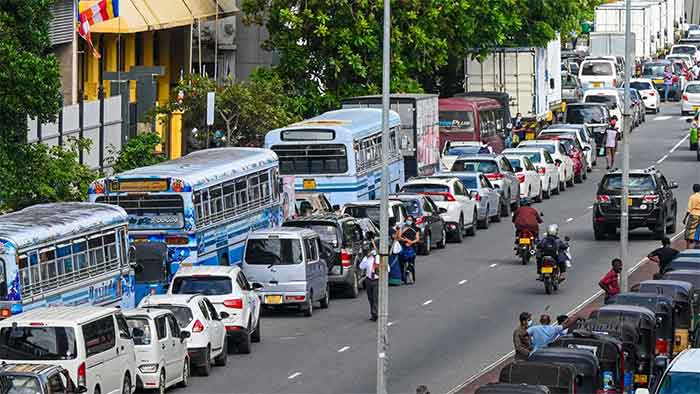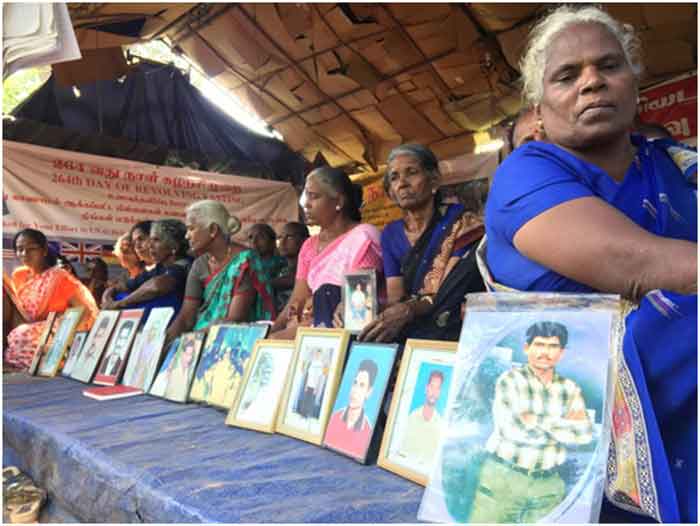
Sri Lanka’s unprecedented economic and political crisis has created new kinds of solidarities among citizens, as they try and help each other ride through fuel and food shortages in the absence of assistance or information from the government.
Take the fuel queues that stretch for a kilometer or more outside petrol pumps in every direction, for example. Vehicles have to be left overnight. Ten members may form an informal group, where two people stay the night in their cars and watch over the other’s cars, while the others return home and rest. Someone else may pick up the baton the next night and so on.
New friendships and new romances have formed in the queues. To optimize their chances, family members split up: husbands line up in one queue and wives may take the second car to another queue. Children go to the third queue. They also organize shifts to relieve members waiting in the queue and send fish buns and tea not only for their loved ones, but strangers too. Tamil and Sinhala, Christian and Muslim, Buddhist and Atheist find themselves next to each other and end up talking about – what else – politics and economics!
To ensure that some semblance of order is maintained, citizens have taken the initiative to number the vehicles. Some of those waiting in line band together and mark the windshield of every vehicle with a felt pen. The vehicle closest to the petrol pump gets the number 1, the vehicle behind is numbered 2 and so on. This system – the initiative of the common folk waiting in the queue and not the government or petrol pump authorities – ensures an orderly procession of vehicles as per their number. It also ensures that outside vehicles cannot jump the queue. Of course, “VIP vehicles” cutting the queue with the help of the pump authorities and police is a different matter. This system has spread to all fuel queues in Colombo thanks to its propagation on social media. Typically, a pump is able to fill around 150 vehicles, so if you arrive in queue and are assigned a number outside 150 you know your chances of getting fuel are slim.
 Next comes the “strategizing”. Does one go to a pump close to home, so that one can walk back at night after leaving the vehicle, or does one wander further afield? That depends on how many vehicles have already lined up. Also, some petrol pumps are known to be frequented by the “tuk tuk mafia” and local thugs. Citizens have formed groups on social media to disseminate information as there is minimal information from the government. A Facebook group called ‘Petrol, Diesel, Gas availability’ shares district wise information on the number of petrol and diesel pumps, their names and location, the type of fuel they are expected to receive and the days on which they will receive it. WhatsApp groups share this information with members. Each city, town and district has come up with its specific groups as citizens step in to fill the breach.
Next comes the “strategizing”. Does one go to a pump close to home, so that one can walk back at night after leaving the vehicle, or does one wander further afield? That depends on how many vehicles have already lined up. Also, some petrol pumps are known to be frequented by the “tuk tuk mafia” and local thugs. Citizens have formed groups on social media to disseminate information as there is minimal information from the government. A Facebook group called ‘Petrol, Diesel, Gas availability’ shares district wise information on the number of petrol and diesel pumps, their names and location, the type of fuel they are expected to receive and the days on which they will receive it. WhatsApp groups share this information with members. Each city, town and district has come up with its specific groups as citizens step in to fill the breach.
These groups also help people strategize. For instance, if one finds that a petrol pump near their home has got 6,600 L of 92 octane petrol – a cheaper quality fuel – on a particular day, they can decide to go there on that particular day. That day could be once a week. But if a petrol pump further afield gets fuel every day, one has to make the decision to drive further, burning more fuel in the process. But the driver has to also bear in mind that if she isn’t within the 150 car limit it could be a wasted trip.
A new system for vehicles queuing at petrol pumps came into force from 1 August. Before that date vehicle owners could obtain fuel twice a week according to the last digit of their number plates: Mondays and Tuesdays for number plates ending in 0,1,2; Tuesdays and Fridays for 3,4,5 and Wednesdays, Saturdays and Sundays for 6,7,8,9. Now anyone can queue up on any day.
On 1 August there was confusion galore. There are no official notifications, only information purportedly from government sources in newspapers and websites. There is a system where QR codes are allocated to everyone waiting in queue, but sufferers allege that the petrol pump owners may be reading individual QR codes and giving the fuel to their friends or “VIP” political contacts. People have waited for 40 hours and more to get fuel, and patience is running thin. There is a pervasive sense in Sri Lanka that the entire system is rigged, everything is up for sale and corruption has permeated every pore of society. In the fuel queues they mumble this over and over.
Meanwhile, food prices have reached hyperinflation territory, resulting in people eating less or skipping meals. Soup kitchens have been started to feed people. Some of these kitchens have hired nutritionists to advise them on how to provide a simple and nutritious meal. People are also trying to grow vegetables in home and rooftop gardens. Expatriate Sri Lankans are sending much needed medicine to help tide over the shortage of essential drugs. People visiting Sri Lanka have been besieged with requests to bring medicine, cigarettes and other items which help calm nerves, but are in short supply.
Some of the petrol pumps in the outer boroughs have a shady reputation. Pumps within Colombo municipal limits, especially near the core Fort area, are perceived to be better. The fuel shortage has led people to ditch cars and take to public transport. Buses and trains, the few that were running, are jam packed as the rich ride with the poor.
Sri Lanka under the Rajapaksas pursued a path of developing highways and other infrastructure to promote domestic consumption. This led to an increase in cars and fuel imports. Investment in mass transit systems was neglected. As a result, the public transport network is creaking, when it is needed the most. Bicycle use has skyrocketed. Demand has outstripped supply even as the government has banned imports, trying to preserve foreign exchange for the most essential items. Cycle stores are empty and prices have shot through the roof. Thefts of bicycles have been reported.
Sri Lanka is rapidly turning into a “post industrial” society, not out of choice, but out of dire need.
J.G.Pandit is a writer and journalist currently reporting from Sri Lanka















































